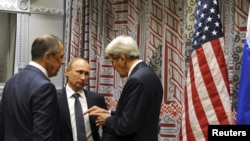Defense Secretary Ashton Carter has directed the Pentagon staff to communicate with Russia about coalition activity in Syria, in order to avoid any mistaken encounter between coalition and Russian forces there.
The talks aim to ensure that coalition actions against the Islamic State in Syria are “not interrupted by Russian activity,” Pentagon spokesman Peter Cook said Tuesday.
Cook said Russia and the coalition would focus on "deconfliction," or decreasing the risk of air accidents by informing each other about aircraft locations.
Russian bombers, fighter jets and troops have arrived in northwest Syria in recent weeks, according to Pentagon officials.
'Practical' talks
President Barack Obama and Russian President Vladimir Putin agreed during their meeting in New York on Monday to start military conversations on a “practical and tactical level” about activity inside Syria, according to a White House official.
“It now appears that our administration is seriously debating some type of an accommodation with the Russians in order to fight ISIS,” Republican Senator Bob Corker of Tennessee, chairman of the Foreign Relations Committee, said Tuesday.
“It’s difficult to understand how working alongside the backers of [Syrian President Bashar al-] Assad could in any way stem the flow of refugees who are fleeing from his barrel bombs.”
Russia, a longtime ally of Assad, has encouraged working with the Syrian government to defeat the Islamic extremists. The United States and members of the coalition say Assad’s use of barrel bombs and chemical weapons against the Syrian people make him unfit to govern.
The start of talks come as Russia, Iraq, Iran and Syria have agreed to share intelligence about the Islamic State, a move that some have interpreted as an expansion of Russia’s influence on Iraq.
“We don’t see this particular development as a setback to our relationship with Iraq,” Cook told VOA at a news briefing Tuesday.
Iranian role
A defense official said on condition of anonymity that the United States was limiting intelligence sharing with Iraq because of Iraq’s military relationship with its eastern neighbor.
“Iran’s role in Iraq is not lost on us,” the official said.
The Pentagon does, however, have concerns about the inclusion of the Syrian government, which the U.S. believes is responsible for the civil war and the rise of the Islamic State from inside Syria’s borders.
“We don't consider that to be a step forward,” Cook said.
Hundreds of thousands of Syrians have died from nearly five years of continual violence in their country, with millions more displaced.












